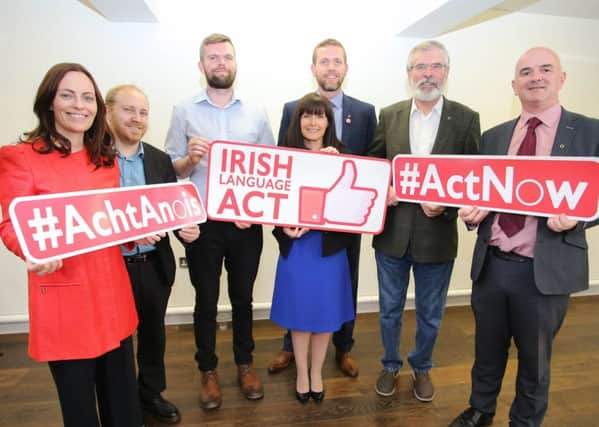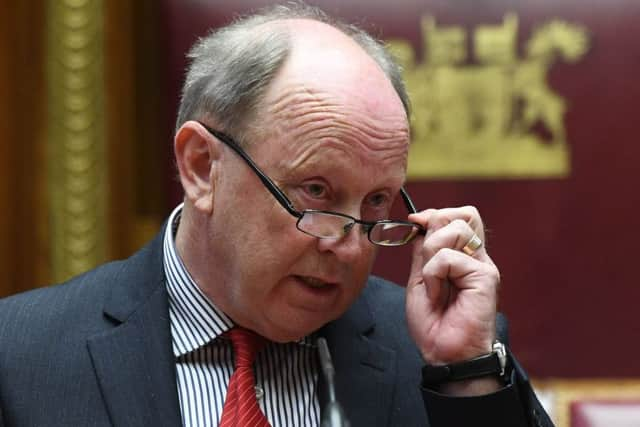Radio interview over language act is '˜wake-up call'


Ciarán Mac Giolla Bhéin, an official with the organisation Conradh Na Gaeilge, gave a frank overview of his group’s ambitions for an Irish language act in a radio interview yesterday morning.
He told listeners to BBC Radio Ulster’s Stephen Nolan Show that the “ultimate ambition” is to see all public services, including those as mundane as a trip to the doctor, available through the Irish language.
Advertisement
Hide AdAdvertisement
Hide AdHe said an “audit” of the public sector should be carried out to “grade” public bodies on their “obligations” under such an act, and that all signs on public buildings and roads would be gradually replaced with bilingual signs.


He also said this should happen even in fiercely loyalist areas such as the Shankill Road.
His organisation, Conradh Na Gaeilge, has been at the forefront of the promotion of the Irish language for over 100 years.
It was founded in the 1890s after Douglas Hyde, who would become its first president, gave an address before the Irish National Literary Society in Dublin entitled the ‘necessity of de-Anglicising Ireland’.
Advertisement
Hide AdAdvertisement
Hide AdMr Mac Giolla Bhéin stressed in yesterday’s broadcast that the Alliance Party, the SDLP, the Green Party and People Before Profit also support his group’s calls for an Irish language act, alongside Sinn Féin.


He had been speaking on BBC Radio Ulster following a warning in yesterday’s News Letter, delivered by the former UUP leader Lord Empey alongside Mr Allister, urging the DUP not to concede to calls for an Irish language act.
In yesterday’s paper, DUP MP Gregory Campbell said there will be “no movement” from his party on a stand-alone act, although he did indicate they may be open to some form of hybrid Irish language/Ulster-Scots legislation.
The TUV’s Jim Allister advised against that, saying: “Whether you wrap it up in tartan bows and throw a few sweeties to the Ulster Scots community doesn’t make any difference.
Advertisement
Hide AdAdvertisement
Hide Ad“There’s no need for an Ulster-Scots language act, there’s no need for an Irish language act, and the reason there is no need for either is because we all perfectly well speak English.
“And to introduce one is to disadvantage those who don’t speak Irish.”
Mr Mac Giolla Bhéin’s comments prompted a strong response from unionists including Lord Empey and Mr Allister.
Mr Allister said: “I think we got from that gentleman the full-frontal demands that they have in respect of the Irish language.
Advertisement
Hide AdAdvertisement
Hide Ad“Of course each one of them is preposterous in terms of the scale of what they are asking for.
“It is confirmatory to the rest of us that it is something that just cannot be conceded. It was a very up-front declaration of what they want.”
He continued: “I think it should be a wake-up call. I’ve been trying to articulate for some time what it means to have a rights based Irish language act and what it leads to, and he spelled it out very clearly.
“Better coming from him than me, because that’s the horse’s mouth as it were. I do hope people realise that behind all the soft-sell, this is the harsh reality.”
Advertisement
Hide AdAdvertisement
Hide AdMr Allister was also interviewed during yesterday’s broadcast. During the radio show, he had asked Mr Mac Giolla Bhéin: ”If you were to go to your GP, they must provide somebody who can talk to you in Irish?
“When you go to the Royal Victoria Hospital, they must provide somebody who can talk to you in Irish?”
The Irish language campaigner replied: “Yeah, that would be the idea.”
He continued: “What we already know is that these people already exist. We have a number of people already employed in the sectors.
Advertisement
Hide AdAdvertisement
Hide Ad“For instance with Belfast City Council I personally know of about six or seven people there that speak Irish.
“Now, the mechanism isn’t in place, the structure’s not in place to allow those people that are already fluent Gaelgeoirs (Irish speakers) to provide services to the public.”
He explained: “What we are talking about, what the proposals that we have put forward, is that this is done on a sensible basis.
“The first thing would be to carry out an audit, and then to grade.
Advertisement
Hide AdAdvertisement
Hide Ad“So for instance, the EA (Education Authority) which provides services to young people, to schools and youth clubs for instance, the obligations on the EA — given that the higher proportion of Irish speakers are young — they would have much higher obligations than for instance the waterways agencies that would have very little public interface.”
Asked whether ”every public service where someone wants to engage in Irish” would need to have “someone speaking Irish” employed there, Mr Mac Giolla Bhéin answered: “That would be the ultimate ambition.”
Mr Allister told the News Letter that the interview confirmed “that the purpose of an Irish language act is to weaponise the language as a political tool for the de-Britishisation of Northern Ireland”.
Ciarán Mac Giolla Bhéin told the BBC yesterday that “every public building” and every road sign would be replaced with bilingual signage.
Advertisement
Hide AdAdvertisement
Hide AdAsked by interviewer Stephen Nolan whether any deal should include “every sign on a public building in Irish as well as English”, Mr Mac Giolla Bhéin said: “Yeah, and I don’t see the problem with that. This is something that’s common across other parts of the world. If you go to Wales you see this.”
He said this would also include the phased replacement of all road signs.
When asked specifically about areas such as the Shankill Road, he said: “I don’t see why the people of the Shankill should be denied that.”